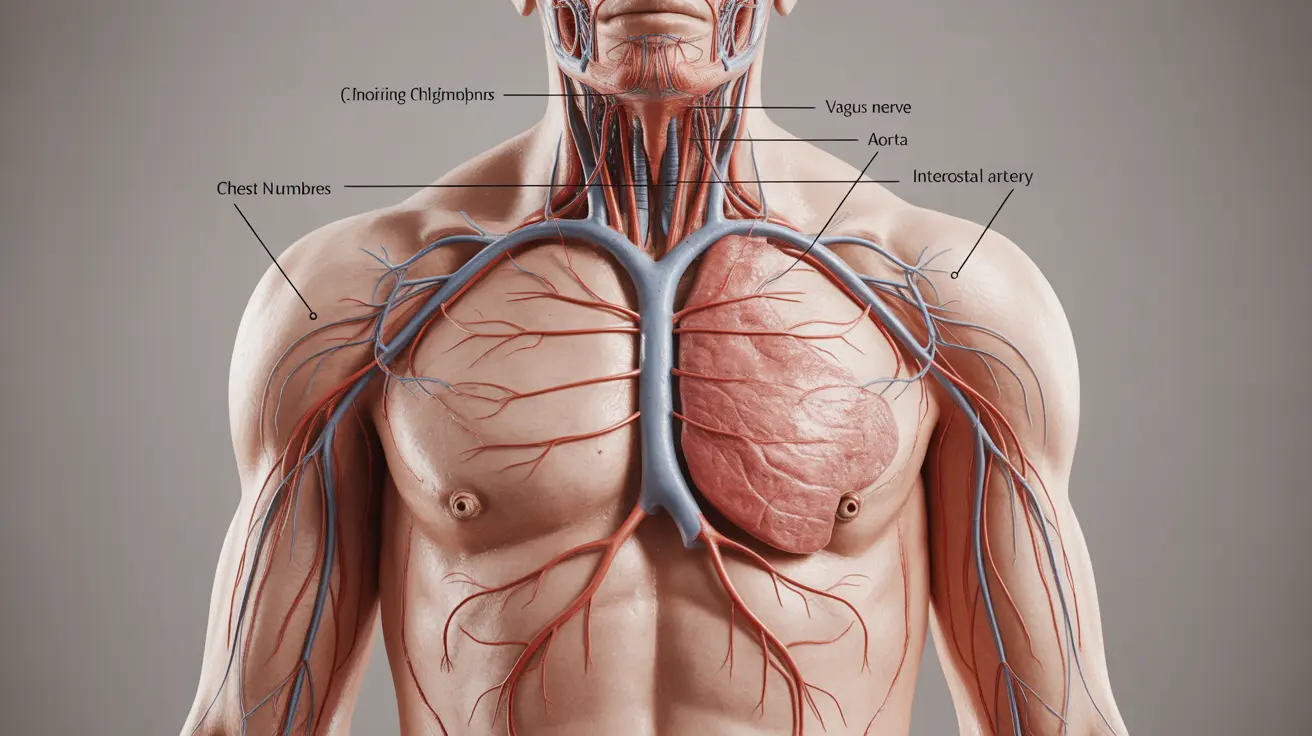Experiencing numbness in the chest can be an unsettling sensation that may cause concern for many people. This unusual feeling can range from a mild tingling to complete loss of sensation in specific areas of the chest. While chest numbness can sometimes indicate serious conditions, it's important to understand its various causes and know when to seek medical attention.
This comprehensive guide will explore the different causes of chest numbness, associated symptoms, and appropriate treatment options, helping you make informed decisions about your health.
Common Causes of Chest Numbness
Chest numbness can stem from various conditions, ranging from minor nerve compression to more serious cardiovascular issues. Here are the most common causes:
Nerve-Related Causes
- Thoracic outlet syndrome
- Pinched nerves in the spine
- Herniated discs
- Nerve compression from poor posture
Cardiovascular Causes
- Reduced blood flow to heart tissue
- Angina
- Early warning signs of heart attack
- Circulation problems
Psychological Causes
- Anxiety and panic attacks
- Stress-induced symptoms
- Hyperventilation
Identifying Serious Symptoms
When experiencing chest numbness, it's crucial to watch for additional symptoms that may indicate a serious condition:
- Shortness of breath
- Pain radiating to the arm, neck, or jaw
- Sweating
- Nausea
- Dizziness
- Irregular heartbeat
Treatment Options and Management
The treatment for chest numbness depends entirely on its underlying cause. Here are some common approaches:
Conservative Treatments
- Physical therapy exercises
- Posture correction
- Stress management techniques
- Breathing exercises
- Lifestyle modifications
Medical Interventions
- Medication for underlying conditions
- Physical therapy
- Surgery (in severe cases)
- Nerve blocks
Prevention Strategies
Taking proactive steps can help prevent or minimize episodes of chest numbness:
- Maintain good posture
- Practice regular exercise
- Manage stress levels
- Avoid prolonged periods in one position
- Stay hydrated
- Get regular medical check-ups
Frequently Asked Questions
What are the most common causes of numbness in the chest?
The most common causes include thoracic outlet syndrome, pinched nerves, anxiety or panic attacks, and sometimes cardiovascular issues. Poor posture, nerve compression, and stress can also contribute to chest numbness.
How can I tell if numbness in my chest is a sign of a heart attack?
If chest numbness is accompanied by pain radiating to the arm or jaw, shortness of breath, sweating, nausea, or dizziness, it could indicate a heart attack. These symptoms require immediate medical attention.
What treatments are available for numbness caused by thoracic outlet syndrome?
Treatment options include physical therapy, posture correction exercises, pain management techniques, and in some cases, surgery. Conservative treatments are typically tried first before considering surgical intervention.
Can anxiety or panic attacks cause numbness or tingling sensations in the chest?
Yes, anxiety and panic attacks commonly cause chest numbness or tingling. These sensations often occur alongside rapid breathing, increased heart rate, and feelings of intense worry or fear.
When should I seek emergency medical help for numbness in my chest?
Seek immediate medical attention if chest numbness occurs with difficulty breathing, chest pain, weakness in arms, confusion, severe dizziness, or loss of consciousness. These could indicate a serious medical emergency.
Remember, while chest numbness can be concerning, understanding its causes and recognizing warning signs can help you make appropriate decisions about seeking medical care. Always consult with healthcare professionals for proper diagnosis and treatment.




